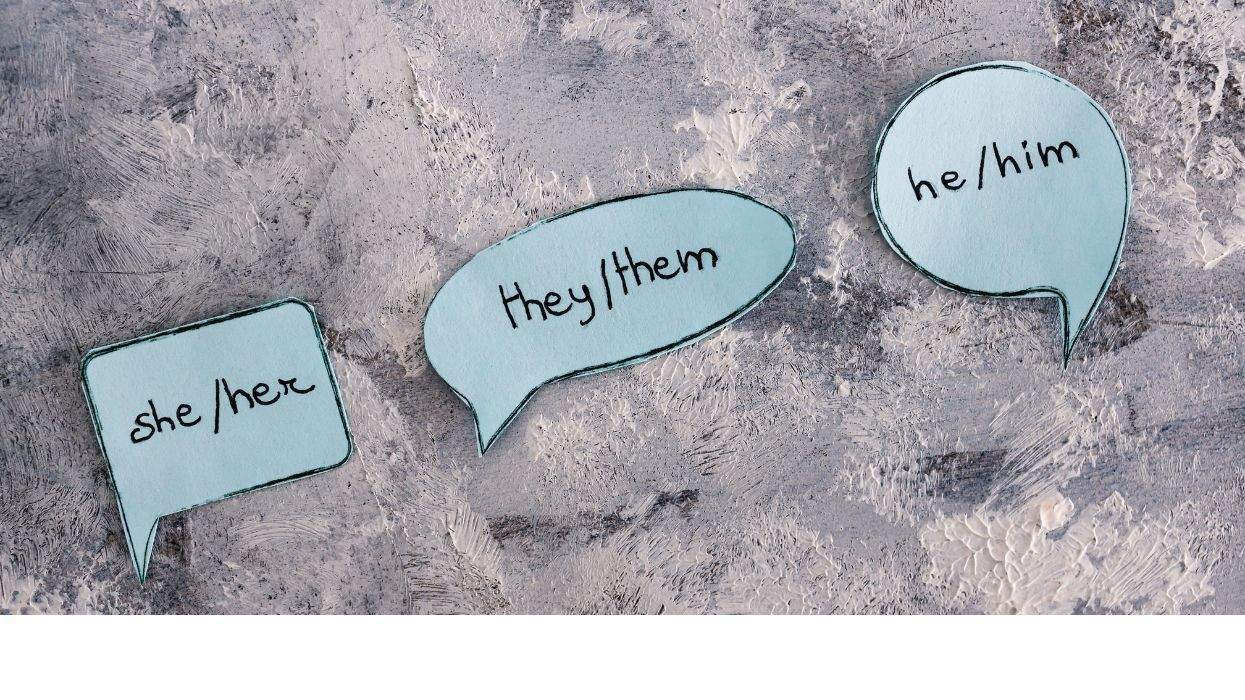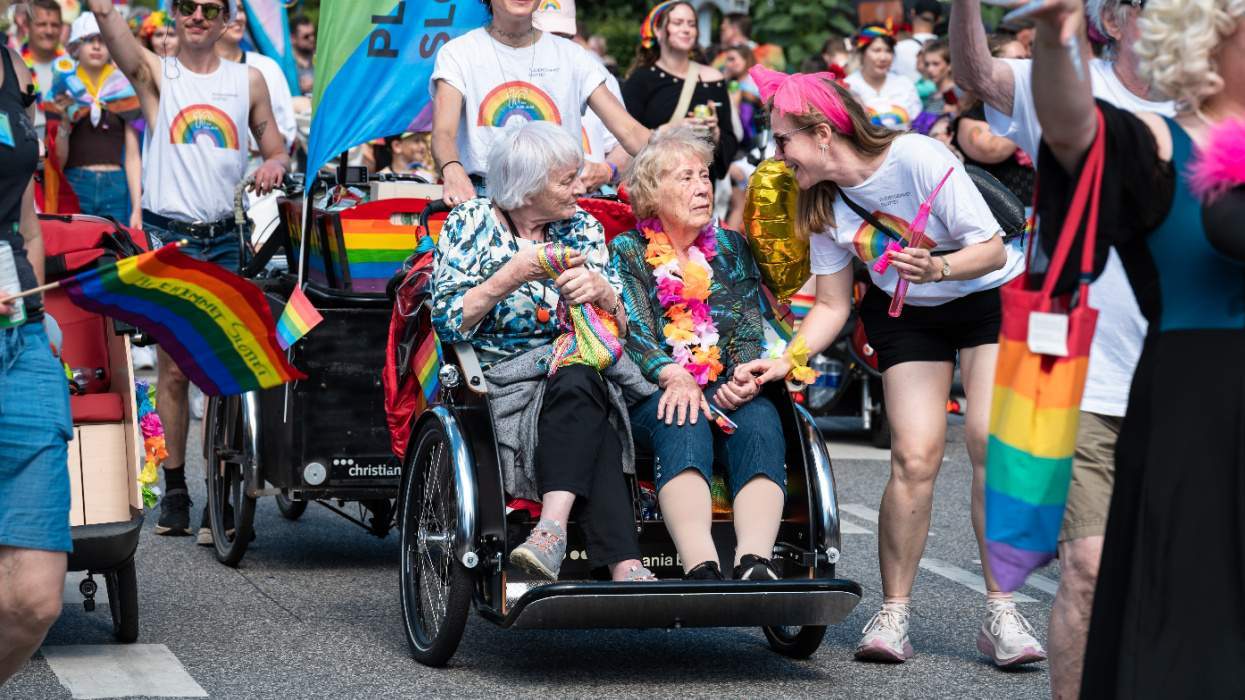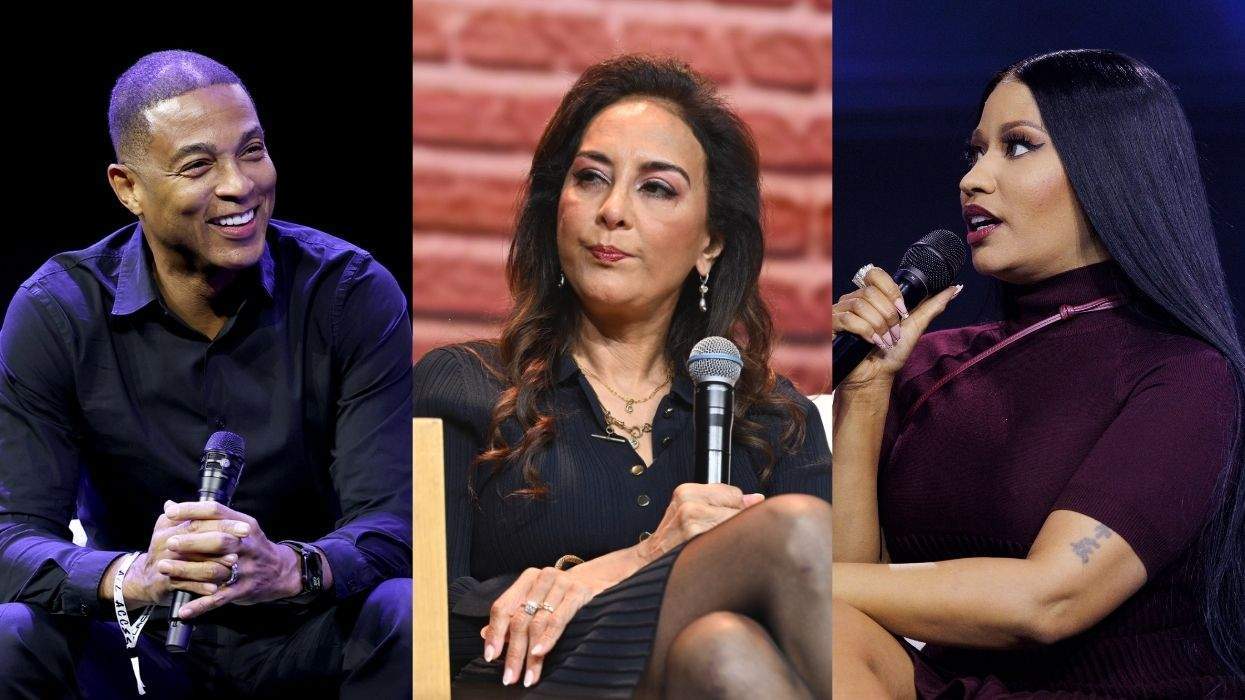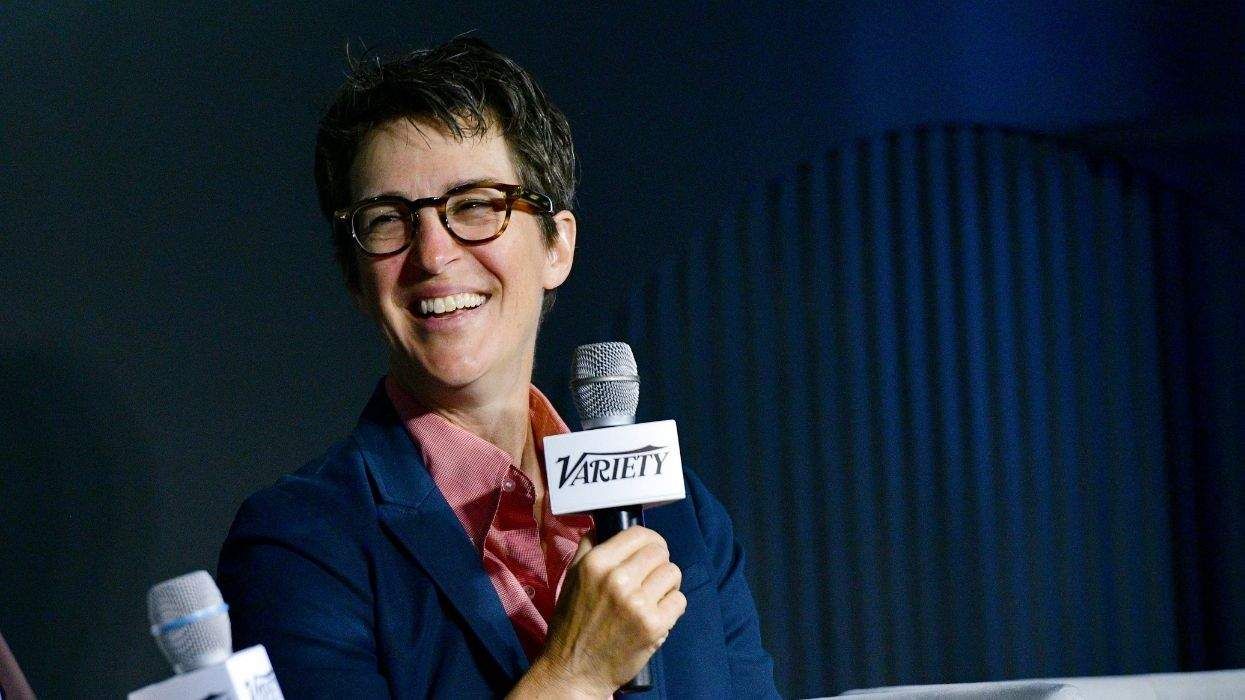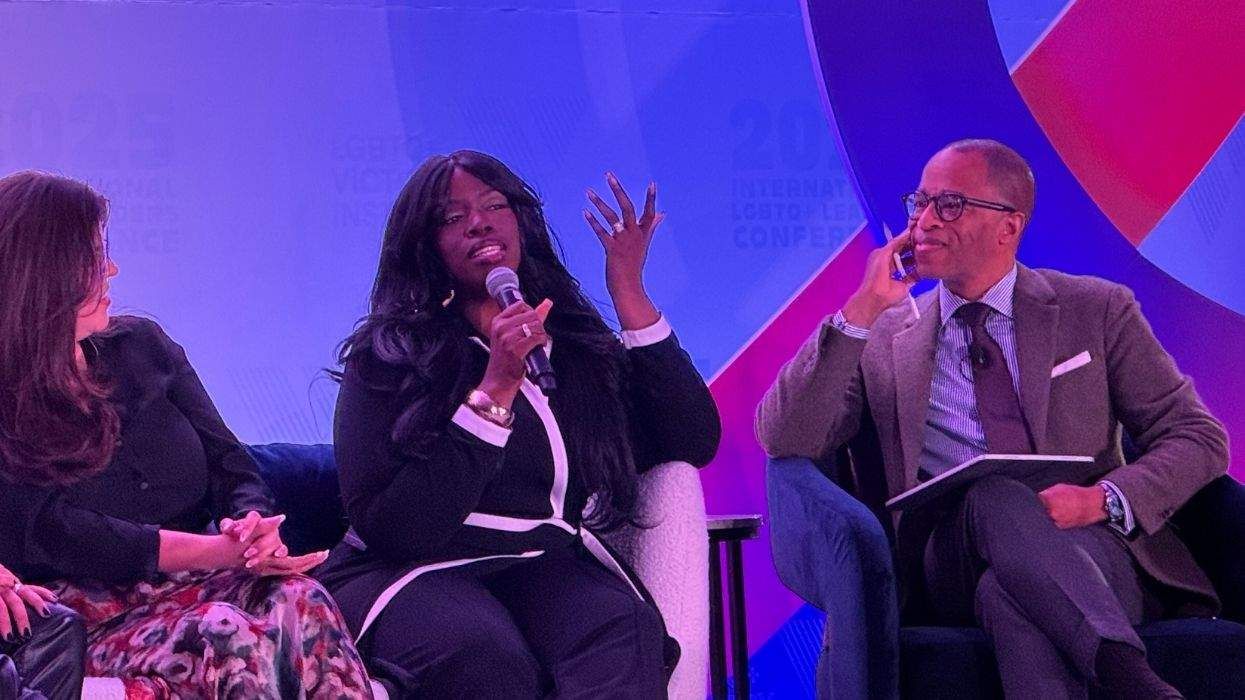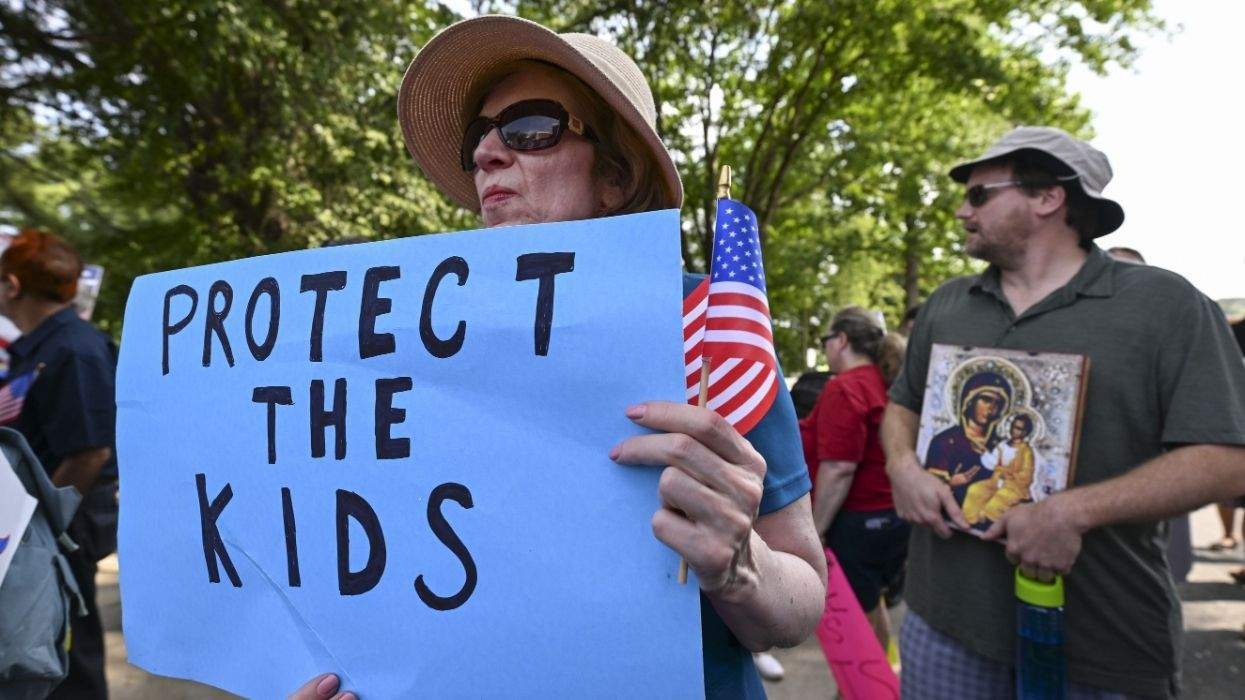An article published earlier this year in the Daily Mail featured photographs of Kristen Stewart and her so-called gal pal Alicia Cargile as they vacationed together in Hawaii. Images showed the pair holding hands and other intimate moments, such as when the American Ultra actress rests her head tenderly on Cargile's shoulder.
The piece, which the U.K. tabloid titled "Kristen Stewart forgoes bikini for a pair of men's Y-fronts ... as she flashes her bra while cosying up to pal Alicia Cargile on Hawaii beach," is a master class in queer innuendo.
Referencing Stewart's ex-boyfriend and Twilight costar Robert Pattinson, the anonymous writer concludes, "It seems she is much more happy enjoying the single life with her friend," an "inseparable" relationship described in captions as a "close bond," a "special bond."
Even Stewart's attire, "a pair of men's underwear" and a "loose-fitting vest top," isn't safe from tongue-in-cheek gender policing. "Girl's will be boys: When it comes to the beach, it seems Kristen is much more comfortable in more masculine attire," one caption reads.
Such reporting -- and it is a fixture of the Daily Mail -- suggests that same-sex love remains "the love that dare not speak its name," as was once proclaimed in the "gross indecency" trials of gay writer Oscar Wilde in 1895. Over a century later, and mainstream media still sounds outright homophobic. While these news outlets deserve part of the blame, the celebrities themselves are also complicit. Kristen Stewart knows how the system works, and she is using it to her advantage.
For decades, media has treated "outing" -- reporting that a person is lesbian, gay, bisexual, or transgender -- as taboo, which is perhaps remarkable when almost every other aspect of celebrities' lives is fair game for tabloids. Citing a fear of invading privacy -- or potential lawsuits -- most reporters choose not to disclose the sexual orientation of celebrities they know to be gay. Or, as in the above example, the language will be coded.
In this cautious approach, it remains the responsibility of a public figure to make a public statement about being LGBT, either through a press conference, speech, or interview, in order to officially be considered out, and for a "gal pal" to graduate to "girlfriend." Until then, the media will apply a different standard of scrutiny to them than to their straight peers.
However, these are not Liberace times anymore. In the 1950s, the performer successfully sued the Daily Mirror for libel, after the U.K. tabloid published coded language that, as in Stewart's case, hinted that he was gay without outright saying it. In the same decade, he settled a similiar case with a U.S. publication. But a 2012 ruling in a New York court, Yonaty v. Mincolla, determined that it is no longer libelous to report that someone is gay, even if they are not. After all, mistakenly identifying a person is gay is not equivalent to erroneously calling someone a crook.
So have the rules of outing in media changed, particularly in a post-Liberace, post-marriage equality world where a celebrity is out to friends and family, and can stroll hand in hand on a public beach with a loved one in broad daylight?
Michelangelo Signorile -- who literally wrote the book on outing, Queer in America, published in 1993-- says yes, the rules have indeed changed in recent years, and "in a lot of good ways." Nontraditional outlets like blogs and social media have created a freer space for reporting on LGBT public figures and their partners in life and romance, which in turn pushes traditional media to do the same.
"A lot of the keys have been taken away from the mainstream media to decide what the rules are in talking about public figures," says the gay journalist, who hosts The Michelangelo Signorile Show on Sirius XM Radio's OutQ and serves as editor at large for The Huffington Post's Gay Voices section. However, he maintains that traditional media "goes back and forth" on these standards. And there is still vast room for better reporting.
Signorile believes wholeheartedly in the two primary guidelines outlined in his book: that media should only report that a person is LGBT if he or she is a public figure, and only if the information is relevant to a story. But he believes that when the media actively employs innuendo or omission, it is complicit in promoting homophobia.
"It's a latent homophobia, but it's couched in a concern for privacy," Signorile says of the media's decision to not report -- or bother to ask -- whether a public figure is gay, even if the information might be newsworthy.
The demographic that is widely agreed upon to be fair game for outing is antigay politicians who are closeted gay people. As government leaders who are doing active harm to LGBT people through their policy stances, these politicians meet the criteria of revelance and public figure status. They are also hypocrites, which may assuage any lingering privacy concerns.
For example, Larry Craig, then a Republican U.S. senator, incited a media firestorm after he was arrested for solicitation in an airport restroom in 2007. (Claiming innocence, Craig infamously said he had a "wide stance" when using the restroom.) The same applied in the case of the Grindr-using North Dakota legislator Randy Boehning as well as Steve Wiles, a former Republican candiate for North Carolina's state Senate, who used to moonlight as a drag queen.
However, other politicians seem off-limits for mainstream media. Aaron Schock -- the Republican congressman who resigned this year amid a controversy over his use of public funds -- was the subject of widespread blogosphere speculation that he is gay. Gay journalist Itay Hod referenced a hypothetical Illinois congressman who fit Schock's description in a 2014 Facebook post, and asked, "Are we still not allowed to out him?" After all, he voted against including sexual orientation in federal hate-crimes legislation and opposed efforts to repeal of the military's ban on out LGB service members, known as "don't ask, don't tell." He was also a vocal critic of the Obama administration's February 2011 decision to stop defending the so-called Defense of Marriage Act.
In light of this track record, many blogs discussed the possibility that he is gay, weighing his appearance, his style, his decision to use taxpayers' money to bankroll a Downton Abbey makeover of his office, and an international trip with a male photographer. But the discussion was nearly absent from traditional media, except via innuendo. Even with his voting record as relevance and his status as a public figure, the mainstream made a decision to stay mum, Signorile says.
Turning a blind eye leads to poor reporting, but disaster can also occur if outlets write about the sexuality of private citizens without proper cause. Such is the case of the recent Gawker article that effectively outed a media executive -- a private citizen who allegedly mailed money to a male sex worker. This piece, which published texts between the two parties, "met neither of those thresholds," Signorile says, since the man is not a public figure and his story lacked relevancy.
The backlash against Gawker for violating these precepts was immediate and severe, prompting CEO Nick Denton to pull the article and issue an apology, a virtually unprecedented move for the truth-seeking blog. Although the reason for the outrage was clear, the open letter did not mention "outing," sexual orientation, or any specific violation of journalistic code, other than an assertion that "the media environment has changed" since "the early days of the Internet," and that it's publishing resulted in "the embarrassment to the subject and his family."
"I believe this public mood reflects a growing recognition that we all have secrets, and they are not all equally worthy of exposure," the gay media mogul wrote.
Would the backlash have been as severe, and would an apology have been issued -- and indeed, would an article have been written in the first place -- if the executive had been texting a female sex worker? Probably not. But then again, it wouldn't have meant the executive had been outed.
At every level, the incident proves the enduring power of homophobia in American culture, acting in this three-part drama as journalistic bait, backlash, and basis for apology.
However, some secrets involving public figures are worthy of exposure, particularly when those secrets engender a culture of homophobia. A part of this homophobia may be rooted in the terminology itself. Signorile has "always hated" the word "outing," which he considers "a violent, active verb" that serves to "demonize" the discussion of a person being LGBT.
"I always just thought it was reporting," he says, adding that there should not be a double standard for reporting on the relationships of straight and gay public figures. If a picture of a man and a woman out in public and a tip from a "Hollywood insider" are enough to justify a tabloid news item speculating they're in a romance, why does that expectation shift when the photograph is of two men or two women?
To illustrate this double standard and debunk the myth of privacy concerns, he cites past coverage of Jodie Foster and her family, in which her young children would be mentioned in the caption of a photograph, but her partner would remain unnamed. This, of course, was before the actress "came out" in a confusing 2013 Golden Globes speech, an act she resentfully referred to at the time as part of an expectation for celebrities "to honor the details of their private life with a press conference, a fragrance, and a prime-time reality show."
"Like, who is that? The nanny?" Signorile says increduously of the unnamed partner in the photo. "Think about it. They have no concern for the privacy of the children at all ... who should be getting some sort of privacy, and they're protecting this other person, while the two of them are out in public, and it's quite clear [they are in a relationship]."
Even when in situations when a public figure's relationship with a person isn't clear, a simple question from a reporter can clarify the matter. This step is par for the course when an actor is known to be straight. But for many journalists, the act of asking that question isn't always so simple.
"If we're supposedly in a much more enlightened place about this, and it doesn't matter, then why is the question a terrible thing to ask?" Signorile says. The Columbia Journalism Review wondered the same thing recently with its article "What's the Right Way to Ask Whether Someone Is Gay?"
LGBT media should be "leading in the way" in this reporting, encourages Signorile. But oftentimes, the opposite occurs. LGBT media outlets are already at a disadvantage in terms of access to A-list actors, who on the red carpet are often ushered to reporters from more mainstream brands. When these interview opportunities do happen, many fear asking the "wrong" questions, which could block the brand from accessing a publicist's entire client roster.
But as Signorile points out, "How can we expect the mainstream media to do something when the gay media doesn't even want to go there?"
"The impulse not to 'go there' when talking about closeted public figures is not about respecting privacy," he continues. "It's about the mainstream media's discomfort, and, ultimately, homophobia, whether conscious or not, [as they are acting like] it's just the most horrible thing and wrong to talk about someone as gay."
A 2013 profile of Ronan Farrow in The New York Times illustrates this indelicate dance. The article, which began by objectifying the "handsome" Farrow, with his "alabaster good looks" and "corn-colored hair lightly tousled," went so far as to mention the then-MSNBC talk show host's frequent appearances in the Washington, D.C., social scene with Jon Lovett, a former speechwriter for President Obama. Stopping there, the writer declared that Farrow is "guarded about his private life, suggesting a persona more carefully calibrated than he lets on."
Whether these outlets have realized it or not, Signorile says, they are giving "special treatment" to public figures whom they know to be gay -- and who are living out lives with their friends and family. The double standard erects a glass closet, "because it's allowing them to be out without saying it."
There is no freedom to be found in a closet, even if it is transparent. And when the world can peer in, as in the case of public figures, what kind of message is that sending the world?
"There is no 'right' to the closet. If you are in it, it is not by your choice," Signorile maintains. "You were forced into it as a child, and you are being held captive by a hypocritical, homophobic society."
"Now is the time to plan your escape," he advises.
At present, Kristen Stewart has kept silent about her identity and her relationship with "gal pal" Alicia Cargile, who were both featured in the Daily Mail, along with such homophobic appellations, as recently as this week. The full title reads, "Style snap! Kristen Stewart and her close gal pal Alicia Cargile sport identical laid-back ensembles as they grab lunch in LA."
Multiple requests for comment from The Advocate to the 25-year-old actress's publicist were left unanswered. In June, Stewart's mother confirmed to the Daily Mirror that the pair were dating but afterward denied she had made the comments, despite a vow from the reporter that "every word is on tape."
The only public comments Stewart has made thus far on the issue occurred in January, shortly after the initial tabloid reports on the photos of her and Cargile. HuffPost Live interviewed Stewart and Julianne Moore in promotion of Still Alice, a film directed by gay couple Wash Westmoreland and the late Richard Glatzer, for which Moore would ultimately win an Oscar for her performance as a woman struggling with Alzheimer's disease.
The interviewer asked Stewart point-blank how often she thought coverage like Daily Mail's was "so far from the truth."
"There's a whole other form of entertainment that's just voraciously consumed in itself," Stewart responded, before Moore jumped in to save her from finishing her answer.
"For her, especially, there's been so much interest in Kristen for the longest time," Moore said. "Because of the size of the movies she's been involved in when she was very young, it's hard to escape that."
"I think that it's also a form of entertainment. I think you have to take all that stuff with a grain of salt, and she often does."
Additional reporting by Diane Anderson-Minshall.

